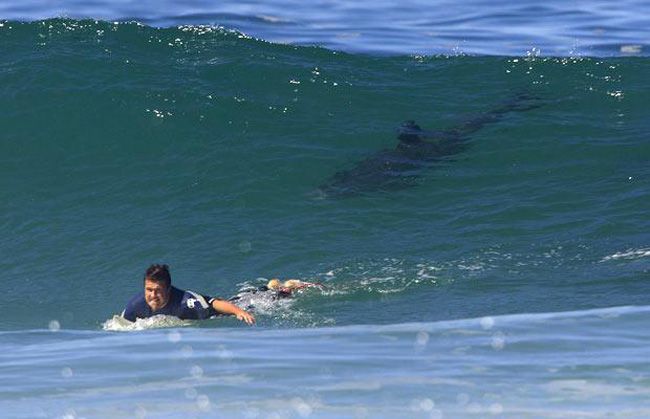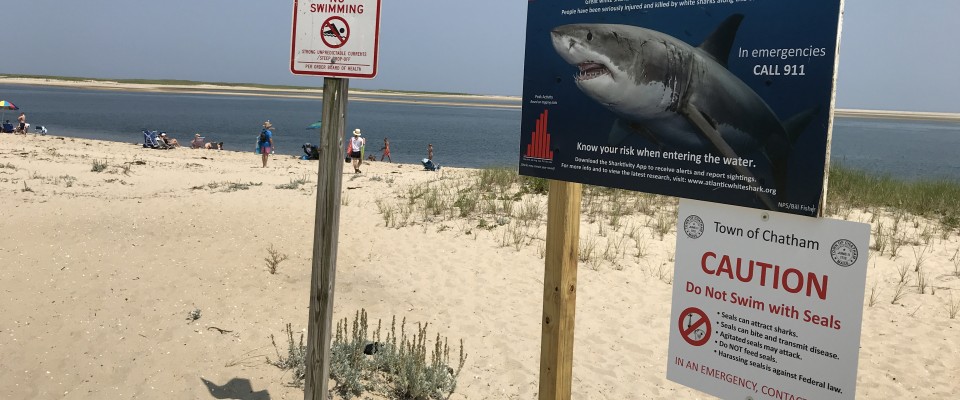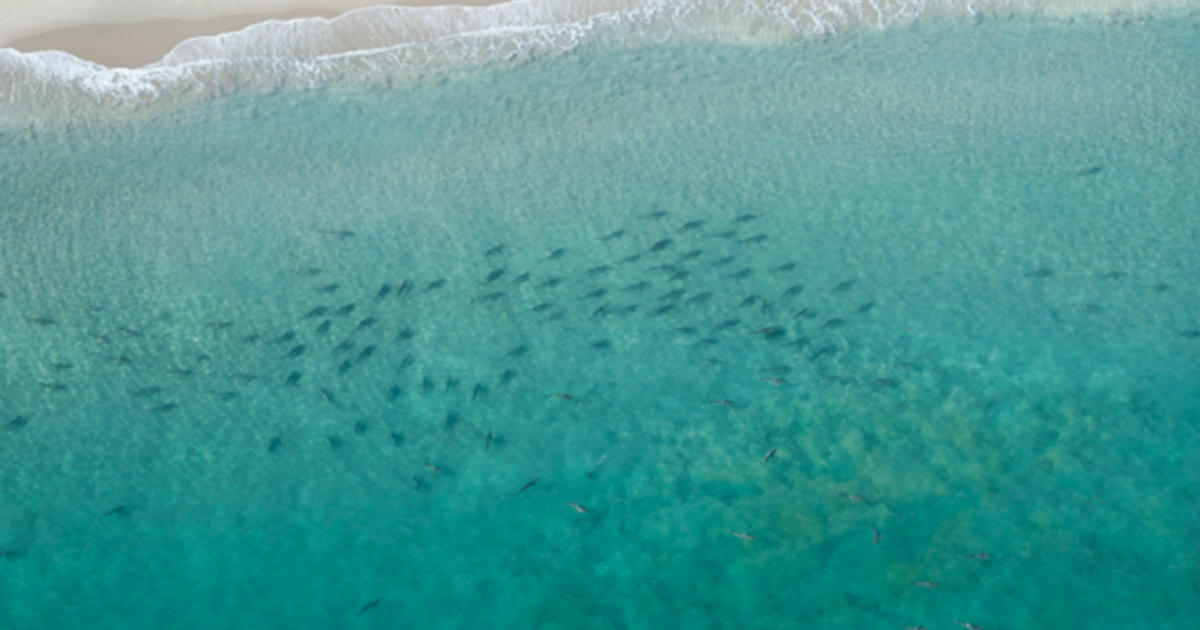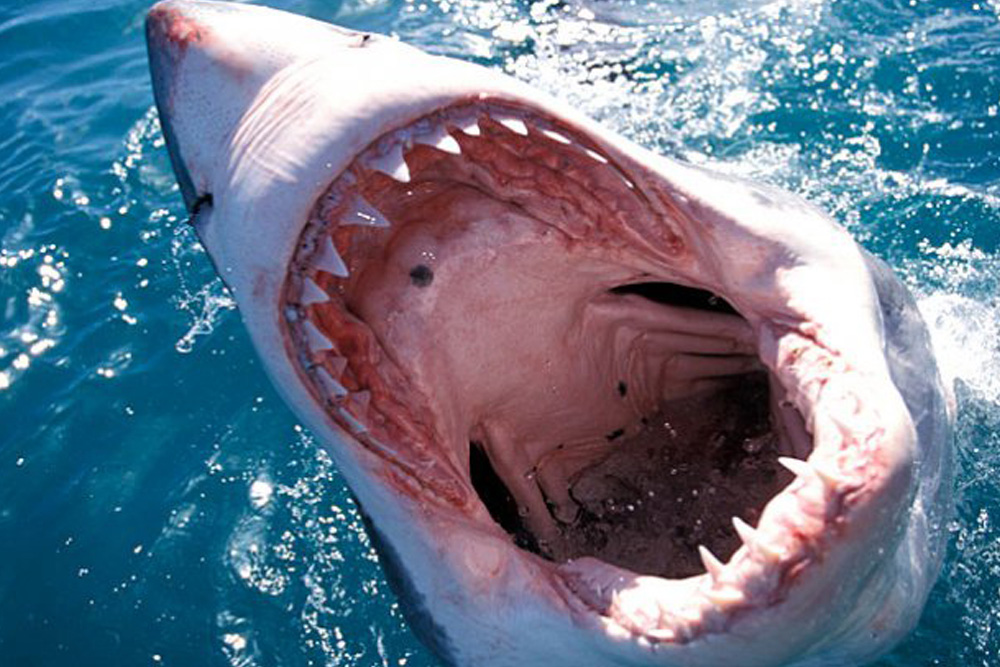 Don't get eaten by a shark. Credit: Pinterest
Don't get eaten by a shark. Credit: PinterestLet’s face it - sharks are scary animals. Sure, they are often misunderstood and get a bad rap since they are incredibly vital to the ecosystem and oceanic food chain and may not mean to attack surfers in particular. Sometimes we just look like food, dressed in our wet suits on our boards appearing as sea lions. But regardless, that doesn’t stop them from being big, frightening marine beasts that can still kill you.
Provided is a guide of how to not get eaten by a shark the next time you're out catching some good waves in shark-infested waters:
 Surf at your own risk. Credit: Cape Cod Chronicle
Surf at your own risk. Credit: Cape Cod ChronicleLook for warning signs. If a shark has been spotted in your area recently, be wary of the danger. Often beaches will have signs telling if a shark has been spotted in the area recently. Don't ignore the signs.
Be wary of surfing at night and at dawn. These are prime hours for when sharks feed. Might be wise to not be surfing when it's dinner time for the sharks that may or may not be in your area.
Surf in groups. Sharks are more likely to attack individuals surfing alone than groups. Plus, the more surfers there are in the water, the lower the chance that you will be the one attacked.
Be wary of river mouths and channels. These are areas where food and fish flow out into the ocean making them feeding grounds for sharks
.
Be careful surfing after recent rainfall. Rainfall causes the water to be murky. The low visibility will make it more difficult for sharks to determine whether you're a human or their next meal.
Don't wear anything bright or shiny in color when you're surfing. Shiny jewelry or bright colors can resemble the scales of fish AKA shark food. Colors to be especially wary of wearing are bright colors like yellow, orange, or any high-contrast color.
 It's a myth that sharks can smell a single drop of blood from a mile away. Credit: Ripley's Believe It or Not!
It's a myth that sharks can smell a single drop of blood from a mile away. Credit: Ripley's Believe It or Not!Don't surf if you're bleeding. This should be a no brainer, as sharks are attracted to blood. It is a myth that sharks can smell a single drop of blood from a mile away. But regardless, they are still attracted to it. If you have an open wound or it is that certain time of the month, please wait until you are healed or when it is safe to get back out into the water.
Stay away from dead animals or fish. Sharks will often feed on dead animals even if they are not the ones that killed it. If you see a dead animal or fish, stay as far away from it as possible.

A migration of sharks along a sandbar in Florida. Credit: CBS News
Beware of underwater drop-offs or sandbars. Often, these provide ideal conditions for surfing. However, they are also known shark hangout areas, so just keep that in mind.
Avoid fishing boats or fishermen. Fishermen use bait to attract fish. Sharks are fish. Sharks also eat fish. Don't be caught at the wrong place at the wrong time and get mistaken for bait.
Get out of the water IMMEDIATELY if there is a shark sighting. Do they really need to scream "SHARK!!!" twice?
 Credit: Ryan Johnson
Credit: Ryan JohnsonNow that you're properly spooked and have a good idea of how to avoid getting attacked by a shark, here's a positive note. According to HowStuffWorks, Professor Jeff Rosenthalfrom the University of Toronto says your chances of getting attacked by a shark are 1 in 9 million. Less than 1 American per year is killed by a shark. Your odds of getting killed by a shark are more like 1 in 400 million.
Fun facts: Over half of all of the world's shark attacks take place on the beaches of Florida. The chances of getting attacked by a shark at a Florida beach are 1 in 430,000 and the odds of getting killed are 1 in 36 million. Also, there are more deaths from coconuts falling on people's heads than there are shark attacks every year!
 Coconuts are more deadly than sharks! Credit: Compare.com
Coconuts are more deadly than sharks! Credit: Compare.com
Great article! Very informative and interesting. Thank you!!! <3
ReplyDelete